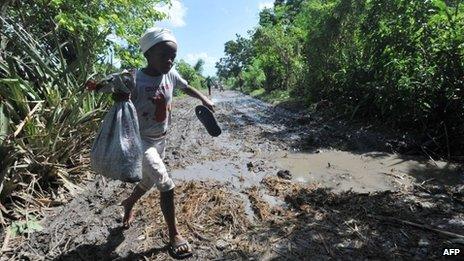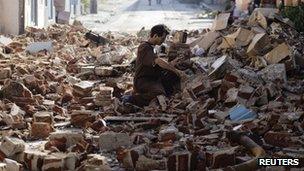Sandy: Haiti fears food shortages after hurricane
- Published

Farmlands in southern Haiti were extensively damaged
Fears are growing of food shortages in Haiti, after the strong winds and heavy rain of Hurricane Sandy caused extensive crop damage.
Aid workers and officials are also warning that flooding could lead to a sharp rise in cholera cases.
Sandy is blamed for some 70 deaths in the Caribbean. Of these more than 50 were in Haiti.
In Jamaica and Cuba, which took direct hits from the hurricane, the clean-up is also continuing.
Sandy, which was a category one hurricane when it clipped Haiti last week, brought heavy rain and flooding.
At least 54 people died in what Prime Minister Laurent Lamothe called a "disaster of major proportions".
There is concern that floods and unsanitary conditions could led to an increase in cholera cases.
More than 7,500 people have died in the cholera epidemic in Haiti since late 2010. Hundreds of new cases are still being registered every week.
Another big worry is the damage to the agriculture sector.
More than 70% of crops - including bananas, plantains and maize - were destroyed in the south of the country, officials said.
Food insecurity, particularly in this part of Haiti, was already a major concern.
Rising food prices have in the past triggered at times violent demonstrations in Haiti.
In Jamaica, Sandy caused extensive damage to crops, including coffee and bananas.
Dozens of houses were destroyed and many more damaged.
"Even before the hurricane we faced serious economic challenges. This has been made worse by the passage of Hurricane Sandy," Prime Minister Portia Simpson Miller said.

Santiago in eastern Cuba bore the brunt of the hurricane
Eleven people died in Cuba, making Sandy one of the deadliest storms there in recent years.
The eastern province of Santiago was the worst-hit, with flooding and landslides destroying crops, knocking out power and damaging buildings.
President Raul Castro, who toured the area on Sunday, warned that recovery would take a long time.
"It's been hard. But Santiago is Santiago. It's resisted gales and wars of every type. It will overcome this," he was quoted as saying by the Communist Party newspaper Granma.